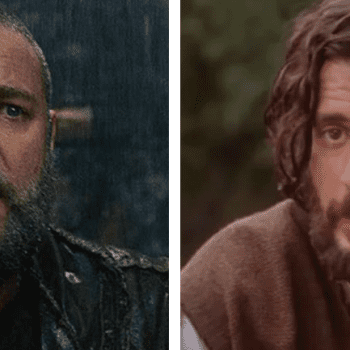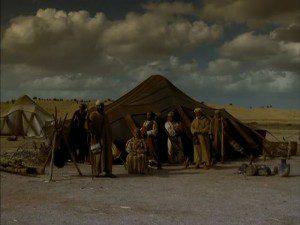 MANY FILMMAKERS have turned to the Good Book for story ideas, but they haven’t always turned those ideas into good movies. The genre’s highs and lows are both on full display in The Bible Collection, an ambitious series of TV-movies that has been produced over the past eight years, and isn’t quite finished yet.
MANY FILMMAKERS have turned to the Good Book for story ideas, but they haven’t always turned those ideas into good movies. The genre’s highs and lows are both on full display in The Bible Collection, an ambitious series of TV-movies that has been produced over the past eight years, and isn’t quite finished yet.
The first four films covered the Book of Genesis in warts-and-all detail, and dealt matter-of-factly with some of the racier episodes that Sunday School classes tend to ignore. Three of these films, focusing on Abraham and his descendants, starred well-known British, American and Australian actors and were broadcast on the Turner network in the United States. One, Joseph, won the Emmy for outstanding mini-series in 1995.
These were followed by films about Moses, Samson and David, also shown on Turner, and a two-part movie about Jesus seen on CBS last year. Four films, however, were not available on this continent until very recently, when they finally came out on video.
• Genesis: The Creation and the Flood, Trimark, 1994, 93 minutes, dir. Ermanno Olmi.
It’s not hard to see why the first film never found a network in the United States. Genesis: The Creation and the Flood has nothing in common with the rest of the series apart from the fact that it was shot in Morocco. Depicting scenes of everyday nomadic life, it’s more like a documentary than a dramatic movie. Except for one or two scenes in which characters speak in their own voices, the entire film is narrated — by Paul Scofield, in the English version — as an old man tells his grandson stories from the early chapters of Genesis.
Many movie buffs will tell you that, since film is a visual medium, you ought to be able to follow any film’s basic narrative thrust with the sound turned off. I suspect Genesis would fail that test, as the film relies heavily on seemingly random and interchangeable shots of babies, animals, plants, sunlight, and an endless stream of caravans. The film is driven by its narration, so much so that we are given a verbal description of, say, the death of Abel, even after we have already witnessed Cain murdering him.
Some visuals are rather intriguing, though. The film mixes images of the pagan festivities of Noah’s day with images of bombs falling on Baghdad, oil fires, tanks and modern junkyards, signifying the damage we have done to creation. All the while, the narrator speaks of a coming judgment. Noah is standing on a raft in the middle of a river when a sudden blast of wind bearing the voice of God compels him to lie down. And when the flood comes, the first raindrops that hit the ground, seen in close-up, look like little bombs.
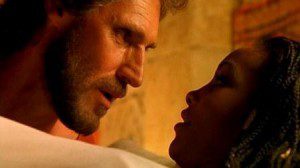 • Solomon, Trimark, 1997, 171 minutes, dir. Roger Young.
• Solomon, Trimark, 1997, 171 minutes, dir. Roger Young.
The films that followed Genesis were all straightforward dramas, some of which brought to life stories that few, if any, previous Bible movies had ever tackled. Solomon is a case in point. His reign has been covered once before, in the 1959 big-screen epic Solomon and Sheba, starring Yul Brynner, but there, in a nod to the Arab-Israeli conflicts of that era, Solomon was turned from the king of peace that he is in the Bible to a warrior who must defend his land from neighbouring countries. The new film takes its own liberties with the text, but by and large, it sticks closer to the Bible.
Directed by Roger Young, who has helmed some of the best films in this series, Solomon depicts a crucial moment in Israelite history. Solomon (Ben Cross) is the first king to inherit the throne from his father, and the traditions that govern how authority is passed from one king to the next are still in flux.
Solomon’s mother Bathsheba (Anouk Aimee) seems to be pulling the royal family’s strings, and his dying father David (Max von Sydow) rather brusquely gives him the order to kill his brother Adonijah as well as the general Joab (David Suchet). Joab is clinging to an altar when a soldier comes and kills him, making his execution a matter of sacrilege — and the film asks, significantly, whether it was right of the ancient Hebrews to let the king speak for God.
The mix of politics and religion is even more pronounced when Solomon oversees the building of the Temple, a palace for God not unlike the palace Solomon builds for himself.
The film has its weaknesses, not the least of which is the romantic melodrama that develops when the Queen of Sheba (Vivica A. Fox) visits Solomon, wins his heart, bears his son, and is forced to go home because the religious leaders object to her presence. The film implies that Solomon’s later moral failures, and the despair that led to the writing of Ecclesiastes, and the political rebellions which followed, were ultimately traceable to his heartbreak over losing the love of his life. That may be too Hollywood for some viewers.
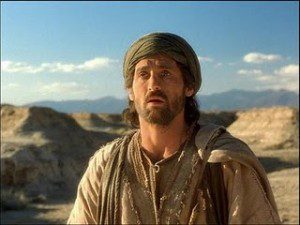 • Jeremiah, Trimark, 1998, 96 minutes, dir. Harry Winer.
• Jeremiah, Trimark, 1998, 96 minutes, dir. Harry Winer.
Romance of a different sort comes up in Jeremiah, too. The destruction of the Temple and the Babylonian exile of the Jews had a permanent impact on the Jewish faith, but this period in biblical history has been all but ignored by the ancient-epic genre. This film, written and directed by Harry Winer, helps to fill that gap, and it does so by focusing on the prophet who warned the Jews of the disaster that awaited them if they did not repent of their idolatry. And because God told Jeremiah (Patrick Dempsey) that he would never marry, the film throws in a subplot involving a girlfriend (Leonor Varela) who represents the life he could have lived if he had not become a prophet.
The film takes some acceptable liberties with the text — God appears to his prophet as a girl and as an old man, and as both at the same time — though it goes off the rails a bit when Jeremiah suggests that sacrificing lambs is a moral crime, tantamount to “shedding innocent blood.”
But the bits where it stays true to the Bible might also sound odd, even offensive, to modern ears. In a pluralist culture like ours, stories about Moses and Samson, who fought back against foreign oppression, are considered okay. But how are we to interpret a story in which a prophet links the fate of his country to a specific religion, and encourages the destruction of other people’s gods?
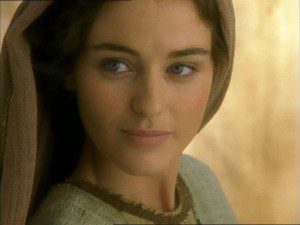 • Esther, Trimark, 1999, 91 minutes, dir. Raffaele Mertes.
• Esther, Trimark, 1999, 91 minutes, dir. Raffaele Mertes.
The next film takes place after the exile has come to an end. The story of Esther, the Jewish girl who became queen of the Persian empire and saved her people from extinction, has been filmed once before, in Esther and the King, a lame 1960 film starring Joan Collins. The new film is more faithful to the biblical story, but it is also a rather pedestrian film, lurching from one plot twist to the next without offering much insight into the characters.
Because it is based on the only book in the Bible that never mentions God by name, Esther hinges on the inner motivations of its main characters more than any other film in this series, but it never adequately fleshes them out.
For example; the film never even tries to build a believable relationship between Esther (Louise Lombard) and Ahasuerus (Thomas Kretschmann), the king who forces hundreds of girls to join his harem and then picks Esther from among them to become his queen. Instead, the film jumps straight from their first meeting, in his bedroom, to her coronation, and then to a point some time later on, when she has fallen out of favour and he has not sent for her in ages.
The film also misses an opportunity to get into the mind of Haman (Jurgen Prochnow), the courtier who nurses his wounded pride, exploits his palace contacts, and comes perilously close to wiping out the Jewish race. His decision to commit genocide seems to come out of nowhere, and the film almost gives the impression that he invented anti-Semitism all by himself.
The film does explore some interesting tensions within Jewish culture at that time. Ezra and Nehemiah did not go to Jerusalem until several decades later, but both characters appear in this film — and one of them, Ezra, is friends with Esther’s cousin Mordechai (F. Murray Abraham). Ezra, who would later expel foreigners and children of mixed racial descent from Israel, is upset that Esther has a Persian name and is married to an uncircumcised man; but Mordechai defends her on both counts.
The film ends with Ezra and Nehemiah moving to the Holy Land; a narrator tells us that Ezra helped the Jews to preserve their Bible, and we see Ezra reading aloud from Genesis. With that, the series comes full circle, and The Bible Collection’s depiction of the Old Testament comes to a close. This is not the end; it is only the beginning.
— A version of this review first appeared in BC Christian News.





